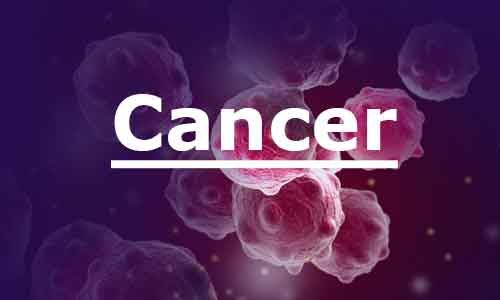Deadlier Disease Cancer; is a group of diseases which involves abnormal cell growth and it spreads to other parts of the body. It is also called Malignant Tumor or Malignant neoplasm. Signs and symptoms include lump, abnormal bleeding, prolonged cough, too much weight loss and changes in bowel movements. Not every time these symptoms indicate the deadlier disease Cancer.
There are many types of Cancer and they are usually named on the basis of the organ or tissue they’re affecting. Types include:
Carcinoma
Leukemia
Lymphoma
Multiple Myeloma
Melanoma
Brain and Spinal Cord Tumors
Other types of Tumors:
Germ Cell Tumor
Neuroendocrine Tumor
Carcinoid Tumor
Therapies/Cure:
Chemotherapy: Chemotherapy is the treatment of cancer with one or more cytotoxic anti-neoplastic drugs as part of a standardized regimen. It was found that providing combined cytotoxic drugs is better than a single drug; a process called the combination therapy. A Cochrane review concluded that combined therapy was more effective to treat metastasized breast cancer. In combination with surgery, chemotherapy has proven useful in cancer types including breast cancer, colorectal cancer, pancreatic cancer and some others.It may be useful to reduce symptoms such as pain or to reduce size of a tumor in the hope that surgery will become possible in the future.
Radiation: Radiation therapy involves the use of ionizing radiation in an attempt to either cure or improve symptoms. It works by damaging the DNA of cancerous tissue, killing it. As with chemotherapy, cancers vary in their response to radiation therapy. Bone Metastasis has been found to be effective in about 70% of patients.
Surgery: Surgery is the primary method of treatment for most isolated, solid cancers and may play a role in palliation and prolongation of survival. It is typically an important part of definitive diagnosis and staging of tumors, as biopsies are usually required. In localized cancer, surgery typically attempts to remove the entire mass along with, in certain cases, the lymph nodes in the area. For some types of cancer this is sufficient to eliminate the cancer.
Palliative care: Palliative care is treatment that attempts to help the patient feel better and may be combined with an attempt to treat the cancer. Palliative care includes action to reduce physical, emotional, spiritual and psycho-social distress. Palliative care is suggested for patients with a prognosis of less than 12 months of life even after giving aggressive treatment.
Immunotherapy: It helps the immune system to fight cancer, a variety of therapies use this.
Laser therapy: This therapy uses high-intensity light to treat cancer by shrinking or destroying tumors or precancerous growths. Lasers are most commonly used to treat superficial cancers that are on the surface. Laser is more recommended than surgery and causes less damage, pain, bleeding, swelling, and scarring. It may be more expensive than other treatments.
Alternative medicine: Most complementary and alternative medicines for cancer have not been studied or tested. Some treatments have been investigated and shown to be ineffective but still continue to be marketed and promoted. Cancer researcher Andrew J. Vickers stated, “The label ‘unproven’ is inappropriate for such therapies; it is time to assert that many alternative cancer therapies have been ‘disproven’.



















